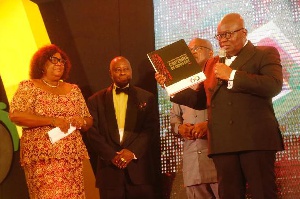Ahead of the establishment and operationalisation three vehicle assembling plants in the country next year, Ghana has resolved to work out a new policy that will regulate the automotive industry.
Ghana this year signed memoranda of understanding with three global automobile manufacturing companies – Volkswagen, Nissan and Sinotruk – to establish assembling plants here to among other things create jobs for the teeming unemployed youth.
President Nana Addo Dankwa Akufo-Addo who announced a new policy is being developed explained the operationalisation of these companies calls for a clear cut policy to govern the automotive industry.
“A comprehensive automotive industry policy will be launched to provide clear and consistent guidelines for the sector,” President Akufo-Addo said on Saturday night while addressing the 7th Association of Ghana Industries’ Awards in Accra.
The President indicated that the structural transformation of the economy, and the rapid development of the industrial sector, especially its manufacturing component, is critical to the peace and success of the country’s attempts to deliver progress and prosperity for all.
“When the exports of cocoa, gold, timber, oil, and other natural resources, in their raw form, account for over 80% of our export revenue, then we know we have a problem we must urgently address, because raw material producing and exporting economies find it difficult to deliver on a sustainable basis, wealth and jobs for their people, and enhance their living standards,” he said.
He observed that the world’s leading economies were developed through industrialisation and value-added activities.
“The greatest aspiration any of us could hope for is the realisation of the investment in the collective vision of Ghana becoming an export-oriented economy, driven by industrial production,” he stated.
Nana Akufo-Addo said since assuming office some 23 months ago, government has shown its determination to hasten and accelerate the process of industrialisation.
“We have begun implementing initiatives such as the ‘1-District-1-Factory’ programme, ‘One Region-One Industrial-Park’ policy, the Stimulus Package for distressed companies, the facilitation of investments into new strategic anchor industries such as automotive and vehicle assembly, pharmaceuticals, garments, textiles, and the exploitation of our bauxite, iron ore and manganese resources,” President Akufo-Addo said.
He also stated that electricity tariffs have been reduced by 30% for businesses, 10% for mining companies, and 25% for special load tariff customers, with water tariff also seeing a 10% reduction.
“All these things are being done to stimulate the revival and growth of economic and industrial activities, and I was happy to see growth in the sector rebound from negative 0.5% in 2016 to 17.7% in 2017, our first year in office. It is projected to be 9.7% next year,” he added.
President Akufo-Addo also revealed that 79 projects have been implemented under 1D1F, with another 35 going through credit appraisal by officials of the Ministry of Trade and Industry and the financial institutions that are supporting the programme.
He stated that under the Stimulus Package, $237 million has been disbursed to 16 companies with an additional 35 being considered for support.
Business News of Sunday, 9 December 2018
Source: 3news.com













